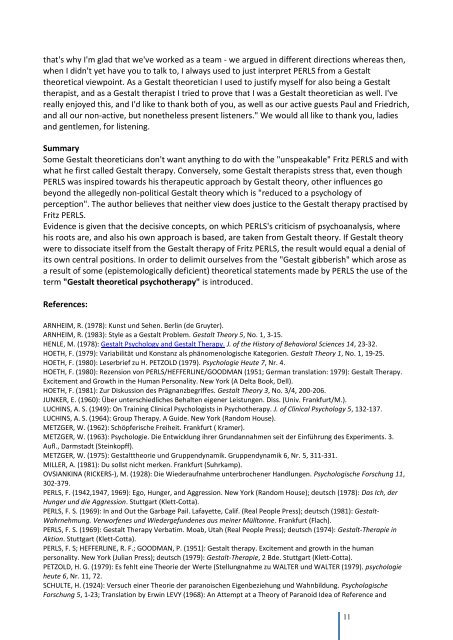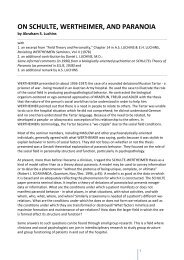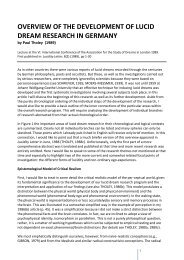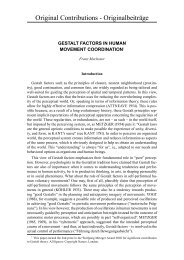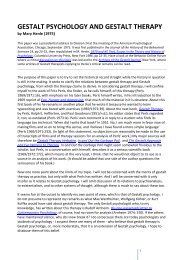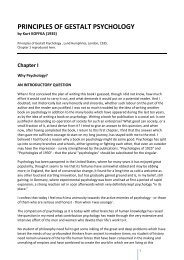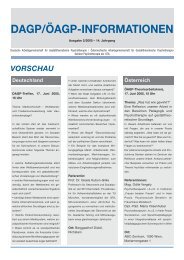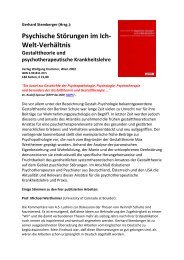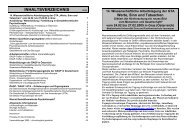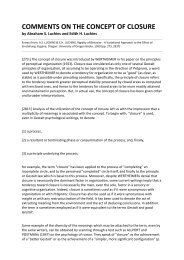pdf-Download - Society for Gestalt Theory and its Applications (GTA)
pdf-Download - Society for Gestalt Theory and its Applications (GTA)
pdf-Download - Society for Gestalt Theory and its Applications (GTA)
Create successful ePaper yourself
Turn your PDF publications into a flip-book with our unique Google optimized e-Paper software.
that's why I'm glad that we've worked as a team - we argued in different directions whereas then,<br />
when I didn't yet have you to talk to, I always used to just interpret PERLS from a <strong>Gestalt</strong><br />
theoretical viewpoint. As a <strong>Gestalt</strong> theoretician I used to justify myself <strong>for</strong> also being a <strong>Gestalt</strong><br />
therapist, <strong>and</strong> as a <strong>Gestalt</strong> therapist I tried to prove that I was a <strong>Gestalt</strong> theoretician as well. I've<br />
really enjoyed this, <strong>and</strong> I'd like to thank both of you, as well as our active guests Paul <strong>and</strong> Friedrich,<br />
<strong>and</strong> all our non-active, but nonetheless present listeners." We would all like to thank you, ladies<br />
<strong>and</strong> gentlemen, <strong>for</strong> listening.<br />
Summary<br />
Some <strong>Gestalt</strong> theoreticians don't want anything to do with the "unspeakable" Fritz PERLS <strong>and</strong> with<br />
what he first called <strong>Gestalt</strong> therapy. Conversely, some <strong>Gestalt</strong> therapists stress that, even though<br />
PERLS was inspired towards his therapeutic approach by <strong>Gestalt</strong> theory, other influences go<br />
beyond the allegedly non-political <strong>Gestalt</strong> theory which is "reduced to a psychology of<br />
perception". The author believes that neither view does justice to the <strong>Gestalt</strong> therapy practised by<br />
Fritz PERLS.<br />
Evidence is given that the decisive concepts, on which PERLS's criticism of psychoanalysis, where<br />
his roots are, <strong>and</strong> also his own approach is based, are taken from <strong>Gestalt</strong> theory. If <strong>Gestalt</strong> theory<br />
were to dissociate <strong>its</strong>elf from the <strong>Gestalt</strong> therapy of Fritz PERLS, the result would equal a denial of<br />
<strong>its</strong> own central positions. In order to delimit ourselves from the "<strong>Gestalt</strong> gibberish" which arose as<br />
a result of some (epistemologically deficient) theoretical statements made by PERLS the use of the<br />
term "<strong>Gestalt</strong> theoretical psychotherapy" is introduced.<br />
References:<br />
ARNHEIM, R. (1978): Kunst und Sehen. Berlin (de Gruyter).<br />
ARNHEIM, R. (1983): Style as a <strong>Gestalt</strong> Problem. <strong>Gestalt</strong> <strong>Theory</strong> 5, No. 1, 3-15.<br />
HENLE, M. (1978): <strong>Gestalt</strong> Psychology <strong>and</strong> <strong>Gestalt</strong> Therapy. J. of the History of Behavioral Sciences 14, 23-32.<br />
HOETH, F. (1979): Variabilität und Konstanz als phänomenologische Kategorien. <strong>Gestalt</strong> <strong>Theory</strong> 1, No. 1, 19-25.<br />
HOETH, F. (1980): Leserbrief zu H. PETZOLD (1979). Psychologie Heute 7, Nr. 4.<br />
HOETH, F. (1980): Rezension von PERLS/HEFFERLINE/GOODMAN (1951; German translation: 1979): <strong>Gestalt</strong> Therapy.<br />
Excitement <strong>and</strong> Growth in the Human Personality. New York (A Delta Book, Dell).<br />
HOETH, F. (1981): Zur Diskussion des Prägnanzbegriffes. <strong>Gestalt</strong> <strong>Theory</strong> 3, No. 3/4, 200-206.<br />
JUNKER, E. (1960): Über unterschiedliches Behalten eigener Leistungen. Diss. (Univ. Frankfurt/M.).<br />
LUCHINS, A. S. (1949): On Training Clinical Psychologists in Psychotherapy. J. of Clinical Psychology 5, 132-137.<br />
LUCHINS, A. S. (1964): Group Therapy. A Guide. New York (R<strong>and</strong>om House).<br />
METZGER, W. (1962): Schöpferische Freiheit. Frankfurt ( Kramer).<br />
METZGER, W. (1963): Psychologie. Die Entwicklung ihrer Grundannahmen seit der Einführung des Experiments. 3.<br />
Aufl., Darmstadt (Steinkopff).<br />
METZGER, W. (1975): <strong>Gestalt</strong>theorie und Gruppendynamik. Gruppendynamik 6, Nr. 5, 311-331.<br />
MILLER, A. (1981): Du sollst nicht merken. Frankfurt (Suhrkamp).<br />
OVSIANKINA (RICKERS-), M. (1928): Die Wiederaufnahme unterbrochener H<strong>and</strong>lungen. Psychologische Forschung 11,<br />
302-379.<br />
PERLS, F. (1942,1947, 1969): Ego, Hunger, <strong>and</strong> Aggression. New York (R<strong>and</strong>om House); deutsch (1978): Das Ich, der<br />
Hunger und die Aggression. Stuttgart (Klett-Cotta).<br />
PERLS, F. S. (1969): In <strong>and</strong> Out the Garbage Pail. Lafayette, Calif. (Real People Press); deutsch (1981): <strong>Gestalt</strong>-<br />
Wahrnehmung. Verworfenes und Wiedergefundenes aus meiner Mülltonne. Frankfurt (Flach).<br />
PERLS, F. S. (1969): <strong>Gestalt</strong> Therapy Verbatim. Moab, Utah (Real People Press); deutsch (1974): <strong>Gestalt</strong>-Therapie in<br />
Aktion. Stuttgart (Klett-Cotta).<br />
PERLS, F. S; HEFFERLINE, R. F.; GOODMAN, P. (1951): <strong>Gestalt</strong> therapy. Excitement <strong>and</strong> growth in the human<br />
personality. New York (Julian Press); deutsch (1979): <strong>Gestalt</strong>-Therapie, 2 Bde. Stuttgart (Klett-Cotta).<br />
PETZOLD, H. G. (1979): Es fehlt eine Theorie der Werte (Stellungnahme zu WALTER und WALTER (1979). psychologie<br />
heute 6, Nr. 11, 72.<br />
SCHULTE, H. (1924): Versuch einer Theorie der paranoischen Eigenbeziehung und Wahnbildung. Psychologische<br />
Forschung 5, 1-23; Translation by Erwin LEVY (1968): An Attempt at a <strong>Theory</strong> of Paranoid Idea of Reference <strong>and</strong><br />
11


